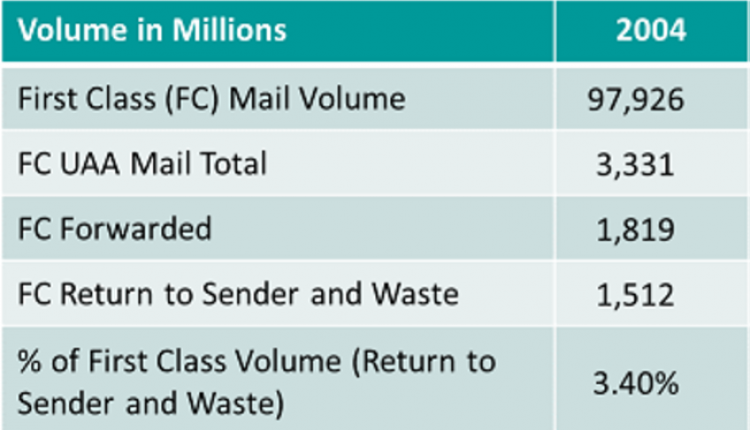For many businesses across America, these have been tough times. The economic ditch we so cleverly put our nation into has taken a toll on every business whose vitality is tied to a thriving economy. The mailing industry has not been spared any pain. In fact, the pain is quite apparent when you consider the number of businesses that have gone bankrupt, those who have been purchased by others, and the thousands of jobs that have been lost to workforce reductions.
While Congress has had the nation as a whole perched on the edge of a fiscal cliff for longer than anyone can justify, it has had the Postal Service on the edge of a precipice that, with one little push, could cause the nation's entire postal system to plummet to its demise. The members of our industry have been working hard to get Congress to recognize precisely what's at risk. When you consider that the mailing industry accounts for some $900 billion worth of the goods and services that make up our gross domestic product, the risk of doing nothing to address what is ailing our postal system is significant and very consequential.
Humans like to pride themselves on their ability to "multitask." The plain and simple fact is that humans don't multitask. They may have machines that evidence this ability, but, for the most part, humans tend to be consumed with one task at a time. If you don't believe that, just consider for a moment how well these multitaskers do while driving (or even crossing a street) and texting or talking on the phone.
This inability to multitask (if not multifocus) has at times been apparent in the way some within our industry have tried to address what they perceive to be the more significant challenges facing the postal industry. Everyone tends to think about the need for postal legislative reform - even when faced with the unpleasant reality that getting Congress to actually do something positive about the nation's postal dilemma can be somewhat akin to getting a stubborn jackass (or elephant, for that matter) to move.
There are, however, other challenges that imperil mail's usefulness and vitality as a commercial vehicle. For instance, for years the advertising mail industry has had to suffer seemingly endless "junk mail" denigrations from competing media, ill-informed, so-called environmental advocates, and self-styled (but profit-based) privacy activists. You know the "Gimme ten dollars and I'll get you off mailing lists" types. These rather ill-informed greenies, money-grubbing privacy weenies, and competitive media meanies often premise their cases against the value and utility of commercial mail on bases about as substantive as a Delmarva beach sand castle built right on water's edge. One good wave or wind-blow and the ostensibly fact-based arguments used to buttress these castles are shown to be without any real foundation. Let's take a look at a few.
NOBODY WANTS MAIL ANYMORE, PARTICULARLY "JUNK MAIL."
First of all, you'll never win an argument that your medium is better than someone else's by attacking that which you are trying to convince some business to give to you. When you use the term "junk," you infer that what you are talking about has no real value. When competitors and detractors use the term "junk mail," they're really referring to advertising that is distributed through the mail.
You've got to wonder. Would newspapers refer to advertising that's distributed through newspapers as "junk news?" Or would broadcasters refer to the advertising they broadcast as "junk TV" or "junk radio?"
Of course not, because advertising in any form has real value. It has value to the people and companies that pay for it to be broadcast or distributed and it has value to the people who are interested in the goods and services advertisers are trying to sell.
In spite of all the noise our detractors make about advertising mail being a nuisance, are you aware that data gathered by respected research firms for well over two decades has indicated that over 80% of all advertising mail, when it is received, is either read immediately or set aside for later reading? In other words, those who receive advertising mail find it interesting or useful enough to want to give it attention by reading it. Tell me, is the same sort of attentiveness given when you hear advertising on the radio or view it on TV, cable, or the Internet?
Advertising mail provides all mail recipients with another very valuable benefit. The money paid to the Postal Service to distribute advertising mail helps keep our nation's universal mail system free to all mail recipients. That's right. People who receive the mail pay nothing as a result of the benefit of having senders pay for the mail they send. When you want to get mail, you don't need to subscribe at great cost to someone's telecommunications or cable network. You don't even need to pay some heady subscription fee to have your mail delivered. All the mail you receive comes to you at no additional cost.
DISCARDED MAIL IS AN ENVIRONMENTAL PARIAH
Some ill-informed, self-styled, and so-called environmental advocates would have you believe that when you received mail you're helping to despoil the American landscape by denuding forests, fill to capacity the nation's landfills, and add to the world's carbon footprint more than some other medium of information exchange. Not so, and here are some of the facts with which you should be familiar.
The wood pulp from which most paper is created comes from tree farms, not preciously endangered national forests. The key word to remember is "farms." You know, those places where things are grown, harvested, and regrown again. In other words, places where there is a cycle of providing and replenishing the raw materials that are used to produce paper.
Most paper today does NOT end up in landfills. Increasingly, more and more paper that is discarded today is collected and either recycled or used as raw material from which energy content can be extracted to provide electricity for those who need it. As a matter of fact, today America has more landfill capacity than it had 30 years ago, and the capacity it has is more environmentally safe than what existed years ago.
At the household level, energy and CO2 emissions associated with the entire mail life cycle are roughly comparable to those from operating any of several common home appliances over the same period of time. Household appliances! Not smokestacks belching carbon and other particulate matter.
In fact, the carbon footprint of mail is substantially less than the total carbon footprint of the internet.
MAIL CONTRIBUTES TO IDENTITY THEFT
Some would have you believe that when you opt to receive mail in your mailbox you're foolishly exposing yourself to a very real likelihood that someone will come by, take out your mail, learn everything about you that there is to know, and deceitfully and illegally use the information that they learn to drain your bank accounts, steal your identify, and render you a pauper. The fact is you have an even greater exposure to identity theft if you make available information about yourself on the Internet.
These days Facebook and Google will know more about you and the manner in which you choose to live your life than your own mother. Security holes on the Internet are very easy to exploit. That's why so many hours and dollars have been spent on software and other services to help thwart online theft.
Heck, "Boris" can have an easier time breaking electronically into your bank and stealing your money than any misguided mail thief. And when Boris decides to violate the sanctity of a mail box, the Postal Service has a dedicated police force (the Postal Inspection Service) that will be sent out to get him. Tell me, who do you go to get attention to the online theft you last suffered?
CONCLUSION
The misinformation and disinformation of those who simply want to advance agendas of their own ostensibly for good or even ill reasons pose a greater threat to the fiscal viability of the republic than postal reform ever could. Postal bills will come and go. Most will never find their way to enactment. But the threat to public confidence in the mail by those who would rather have mail-based dollars flow from your pockets into their own constitute the real threat. And when the threat of an ill-designed postal bill will go away with each expiring Congress, the threats posed by mail 's detractors will be more enduring.
These are the threats your mail-based business faces every day. These are the threats you cannot afford to ignore. Arm yourself with facts, and make sure the universal mail system you enjoy today will still be around to serve you and your business tomorrow.
While Congress has had the nation as a whole perched on the edge of a fiscal cliff for longer than anyone can justify, it has had the Postal Service on the edge of a precipice that, with one little push, could cause the nation's entire postal system to plummet to its demise. The members of our industry have been working hard to get Congress to recognize precisely what's at risk. When you consider that the mailing industry accounts for some $900 billion worth of the goods and services that make up our gross domestic product, the risk of doing nothing to address what is ailing our postal system is significant and very consequential.
Humans like to pride themselves on their ability to "multitask." The plain and simple fact is that humans don't multitask. They may have machines that evidence this ability, but, for the most part, humans tend to be consumed with one task at a time. If you don't believe that, just consider for a moment how well these multitaskers do while driving (or even crossing a street) and texting or talking on the phone.
This inability to multitask (if not multifocus) has at times been apparent in the way some within our industry have tried to address what they perceive to be the more significant challenges facing the postal industry. Everyone tends to think about the need for postal legislative reform - even when faced with the unpleasant reality that getting Congress to actually do something positive about the nation's postal dilemma can be somewhat akin to getting a stubborn jackass (or elephant, for that matter) to move.
There are, however, other challenges that imperil mail's usefulness and vitality as a commercial vehicle. For instance, for years the advertising mail industry has had to suffer seemingly endless "junk mail" denigrations from competing media, ill-informed, so-called environmental advocates, and self-styled (but profit-based) privacy activists. You know the "Gimme ten dollars and I'll get you off mailing lists" types. These rather ill-informed greenies, money-grubbing privacy weenies, and competitive media meanies often premise their cases against the value and utility of commercial mail on bases about as substantive as a Delmarva beach sand castle built right on water's edge. One good wave or wind-blow and the ostensibly fact-based arguments used to buttress these castles are shown to be without any real foundation. Let's take a look at a few.
NOBODY WANTS MAIL ANYMORE, PARTICULARLY "JUNK MAIL."
First of all, you'll never win an argument that your medium is better than someone else's by attacking that which you are trying to convince some business to give to you. When you use the term "junk," you infer that what you are talking about has no real value. When competitors and detractors use the term "junk mail," they're really referring to advertising that is distributed through the mail.
You've got to wonder. Would newspapers refer to advertising that's distributed through newspapers as "junk news?" Or would broadcasters refer to the advertising they broadcast as "junk TV" or "junk radio?"
Of course not, because advertising in any form has real value. It has value to the people and companies that pay for it to be broadcast or distributed and it has value to the people who are interested in the goods and services advertisers are trying to sell.
In spite of all the noise our detractors make about advertising mail being a nuisance, are you aware that data gathered by respected research firms for well over two decades has indicated that over 80% of all advertising mail, when it is received, is either read immediately or set aside for later reading? In other words, those who receive advertising mail find it interesting or useful enough to want to give it attention by reading it. Tell me, is the same sort of attentiveness given when you hear advertising on the radio or view it on TV, cable, or the Internet?
Advertising mail provides all mail recipients with another very valuable benefit. The money paid to the Postal Service to distribute advertising mail helps keep our nation's universal mail system free to all mail recipients. That's right. People who receive the mail pay nothing as a result of the benefit of having senders pay for the mail they send. When you want to get mail, you don't need to subscribe at great cost to someone's telecommunications or cable network. You don't even need to pay some heady subscription fee to have your mail delivered. All the mail you receive comes to you at no additional cost.
DISCARDED MAIL IS AN ENVIRONMENTAL PARIAH
Some ill-informed, self-styled, and so-called environmental advocates would have you believe that when you received mail you're helping to despoil the American landscape by denuding forests, fill to capacity the nation's landfills, and add to the world's carbon footprint more than some other medium of information exchange. Not so, and here are some of the facts with which you should be familiar.
The wood pulp from which most paper is created comes from tree farms, not preciously endangered national forests. The key word to remember is "farms." You know, those places where things are grown, harvested, and regrown again. In other words, places where there is a cycle of providing and replenishing the raw materials that are used to produce paper.
Most paper today does NOT end up in landfills. Increasingly, more and more paper that is discarded today is collected and either recycled or used as raw material from which energy content can be extracted to provide electricity for those who need it. As a matter of fact, today America has more landfill capacity than it had 30 years ago, and the capacity it has is more environmentally safe than what existed years ago.
At the household level, energy and CO2 emissions associated with the entire mail life cycle are roughly comparable to those from operating any of several common home appliances over the same period of time. Household appliances! Not smokestacks belching carbon and other particulate matter.
In fact, the carbon footprint of mail is substantially less than the total carbon footprint of the internet.
MAIL CONTRIBUTES TO IDENTITY THEFT
Some would have you believe that when you opt to receive mail in your mailbox you're foolishly exposing yourself to a very real likelihood that someone will come by, take out your mail, learn everything about you that there is to know, and deceitfully and illegally use the information that they learn to drain your bank accounts, steal your identify, and render you a pauper. The fact is you have an even greater exposure to identity theft if you make available information about yourself on the Internet.
These days Facebook and Google will know more about you and the manner in which you choose to live your life than your own mother. Security holes on the Internet are very easy to exploit. That's why so many hours and dollars have been spent on software and other services to help thwart online theft.
Heck, "Boris" can have an easier time breaking electronically into your bank and stealing your money than any misguided mail thief. And when Boris decides to violate the sanctity of a mail box, the Postal Service has a dedicated police force (the Postal Inspection Service) that will be sent out to get him. Tell me, who do you go to get attention to the online theft you last suffered?
CONCLUSION
The misinformation and disinformation of those who simply want to advance agendas of their own ostensibly for good or even ill reasons pose a greater threat to the fiscal viability of the republic than postal reform ever could. Postal bills will come and go. Most will never find their way to enactment. But the threat to public confidence in the mail by those who would rather have mail-based dollars flow from your pockets into their own constitute the real threat. And when the threat of an ill-designed postal bill will go away with each expiring Congress, the threats posed by mail 's detractors will be more enduring.
These are the threats your mail-based business faces every day. These are the threats you cannot afford to ignore. Arm yourself with facts, and make sure the universal mail system you enjoy today will still be around to serve you and your business tomorrow.





